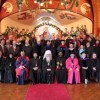“Unless the Lord comes to us, we are completely helpless.”
+St. Maximos
November is here. Our neighbors are already stringing up lights and setting out Santas on the lawn. The mailbox is overflowing every day with glossy catalogs selling the merchandise of comfort and indulgence. We have all imbibed the materialistic mindset, to one degree or another.
As I anticipate our Orthodox Advent season, I am acutely aware of my spiritual poverty. I have charged through my days heedless, as the mellow fall sun has illumined a fiery display of gold and magenta, flaming orange and russet red. “Glory to God!” the colors have shouted, but most of the time I have been too distracted to stop and notice. The cell phone rings, the car needs gas, my Facebook notifications tell me I’m missing updates from my friends. The errand list is a mile long, the job has its demands, and the children need rides or tutoring or food. Squeezing in morning prayers here and there and attending church on Sunday, I acknowledge God’s existence, before getting back to the “real” business at hand.
I admit it: sometimes I bury myself with my busyness because I don’t want to be alone with Him. In the silence of prayer and contemplation before our icons, I am stripped away of any false pretense of piety. This confrontation with my sin and hard heartedness is painful; indeed, trying to practice the disciplines of the Church in the midst of Christmas season is definitely an uphill climb! I don’t want to think about fasting, or almsgiving, or being more consistent in prayer.
Yet mercifully, the longing for God’s presence regularly surfaces despite the noise and distractions. Oftentimes I am acutely aware of the void within, as was the Psalmist when he plaintively penned, “As a deer pants for the water brooks, So pants my soul for You, O God. My soul thirsts for God, for the living God,” (Ps. 42).
Just when we need it, the holy season of Advent arrives. Rather than being burdensome, the spiritual habits and proscriptions given to us in the Church are a lifeline. Certainly, there have been times when we struggle to understand why we approach Christmas with such sobriety. This is a season for parties! For gifts! For happy celebrations! For family! What’s this fasting in the midst of “’tis the season to be jolly”? Why this remembrance of Christ’s death, these extra services that mirror the somber services of Holy Week?
Father Thomas Hopko explains in his book, The Winter Pascha:
“The Lord’s birth and baptism are directly connected to His dying and rising. He was born in order to die…the harmony between the events is overwhelming…Jesus lay as an infant in the cavern in the reign of Caesar Augustus that He might lay in the tomb under Pontius Pilate. He was hounded by Herod that He might be caught by Caiaphas…He was worshipped by wise men that the whole of creation might adore Him in His triumph over death.”
Christ comes to us, then, and we do rejoice, for we are indeed helpless and have no life apart from Him. But the shadow of a cross falls over the tender and peaceful scene at the stable. His suffering life, His sacrifice, the weight of the world’s sins; all are implicit in, and present at, His birth. So our Advent celebrations should be tempered by this reality; the bright Lenten sadness is there at the manger, too.
Some years, the sober 40 days of preparation prior to the Nativity Feast come as a welcome relief. The year my father died, the quiet, reflective spirit of Orthodox Advent was a comfort. Anyone who has suffered a deep loss or sorrow through illness or death knows about the sadness that accompanies the holidays; the shadows are long across the paths of those who are grieving at this time of year.
Yet even in the sanguine years, we must prepare our hearts if we hope to receive “the King of all.” Somehow we must find ways to filter the saccharine messages daily delivered via our screens and social media, our work and school parties, and our stores. As the waning winter light bids us flee the cold and we light a fire in the sanctuary of our homes, so Advent is a time to for us to enter into the sanctuary of our souls, stoking the fires of our hearts through repentance, cleaning out the cobwebs in preparation for the birth of God anew in the center of our being.
How can we prepare for Christ’s arrival? The Church gives us these ways:
+Increase our prayer. Says Fr. Anthony Coniaris, “The two great movements of the soul have always been withdrawal and return…withdrawal into God’s presence through prayer for strength…without prayer, the quality of our service deteriorates. Without prayer we forget the world; with prayer we remember.” Advent is a time to remember that in God, we move and breathe and have our being, and we must be with Him and consciously in Him before we can have authentic love and relationship with others.
+Give alms. There is something poetic about giving money and perhaps even more important in these busy times, our time, to others who are in need at Christmas time. We can battle our self indulgence with self sacrifice, by giving freely, with joy and gratitude to God for His good gifts to us. St. John Chrysostom writes, “It is not enough to help the poor. We must help them with generosity and without grumbling. And it is not enough to help them without grumbling. We must help them gladly and happily. When the poor are helped there ought to be these two conditions: generosity and joy.”
+Attend midweek services. The Advent season provides extra opportunities to be in the atmosphere of worship. Isn’t it true that when we walk into the doors of our parishes, and those doors swing shut behind us, the flickering candles and the sights and smells of icons and incense before us, aid us in our seasonal preparations? So many things crowd our calendars, yet the rewards are always great. As Fr. Alexander Schmemann writes,”There is no need to preach constantly on ‘sin,’ to judge and condemn. It is when a man is challenged with the real contents of the Gospel, with its Divine depth and wisdom, beauty and all embracing meaning, that he becomes ‘capable of repentance,’ for true repentance is precisely the discovery by the man of the abyss that separates him from God and from His real offer to man. It is when the man sees the bridal chamber adorned that he realizes that he has no garment for entering it.”
+Remember some of the unique and remarkable saints of the Advent season, reading about their lives and celebrating their days of remembrance. Of course, we remember St. Nicholas (December 6 (19)) as he is commonly honored at this time of year, but what about some of the others? St. Herman of Alaska (December 13 (26)) exemplified the spirit of this time of year to perfection, and he belongs to us here in America, so let’s not let the day go by without reading about him and recalling his sacrificial life with the people of Alaska. St. Stephen the Protomartyr is remembered on December 26 (January 8) the day after the Nativity service, and he too can be venerated for his godly example. On New Year’s Day, we honor the brilliant St. Basil, who spoke with erudition and intelligence to the issues of his day in a manner that transformed the Church.
+Go to confession. If there is any act out of step with the vain and glib holiday atmosphere presented to us by the spirit of this age, it is act of the repentant Christian confessing his or her sins. Said Dorothy Day, “Going to confession is hard, hard when you have sins to confess, hard when you haven’t, and you wrack your brain for even the beginnings of sins against charity, chastity, sins of distraction, sloth or gluttony. You do not want to make too much of your constant imperfections…but you want to drag them out to the light of day as the first step in getting rid of them…I have sinned. These are my sins. That is all you are supposed to tell; not the sins of others, or your own virtues, but only your ugly, gray, drab, monotonous sins.” Blessed are those who mourn, for it is precisely in this mourning that we receive comfort. These are the tidings of comfort and joy that the Christmas carol songwriter celebrates—redemption from the guilt and weight of sin!
+Incorporate the Church’s traditions in ways that make sense for us here and now. Though we are not perfect fasters by any means, our family eats more simply in the season of Advent. We celebrate St. Nicholas Day by putting out shoes on the night of December 5 so that “St. Nicholas” can fill them with gold coins while the children sleep. We read about his life, marveling at his overflowing love and goodness. We listen to Orthodox Christmas music and we keep an Advent wreath and calendar for six Sundays instead of four. We enjoy a traditional Christmas Eve dinner incorporating old world traditions.
We can all adapt our own cultural traditions to incorporate the spirit of Orthodox worship and emphasis at this time of year. Each person and each family can express their God-given creativity in their commemoration of Christ’s coming.
Author Matthew Gallatin has said that we often celebrate the Christmas season in backwards fashion. “Just as the guest of honor walks through the door, it’s all over,” he writes. This year, may we embrace the Orthodox vision of holy preparation, so that when December 25 (January 7) dawns, we will be ready to receive Christ in the feast, the “Winter Pascha” of Nativity!
















